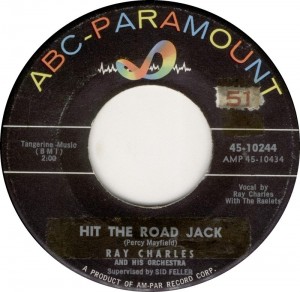
 The entire Ray Charles saga is far too extensive to enumerate here, so I would like to focus on one crucial period of his great career. It was a time in which Charles left Atlantic Records, where he had enjoyed enormous fame and fortune, and went looking for a new deal. He found it at ABC-Paramount, and his career soared to new heights.
The entire Ray Charles saga is far too extensive to enumerate here, so I would like to focus on one crucial period of his great career. It was a time in which Charles left Atlantic Records, where he had enjoyed enormous fame and fortune, and went looking for a new deal. He found it at ABC-Paramount, and his career soared to new heights.
The peak of Charles’ career at Atlantic had undoubtedly been the release of “What I Say” in 1959. The record was an enormous hit, but Charles saw an opportunity on the horizon with his Atlantic contract coming up for renewal in the fall of that year. He received several lucrative offers from other labels.
Charles decided not to try to renegotiate his Atlantic contract, and signed with ABC-Paramount Records in November. The deal gave him a $50,000 a year advance, a better royalty rate, and crucially, ownership of his master recordings. While Charles had been a successful songwriter during his Atlantic years, by this time he had pretty much given that up and decided to make his name as an interpreter of other people’s work.
The first single for ABC-Paramount was a little something called “Georgia On My Mind.” It was of course a huge hit in 1960, and won Charles a Grammy. The follow-up single, “Hit the Road Jack”, was also a hit, and won Charles another Grammy. The song was written by bluesman Percy Mayfield, who had sent an a cappella demo of it to Art Rupe of Specialty Records in 1960. “Hit the Road Jack” pits the male protagonist, Charles, against an angry woman, portrayed on the record by Raelette Margie Hendricks. The uproarious result finds Charles pleading for forgiveness with his pleas falling on the deaf ears of Hendricks who just wants him gone. “You can’t mean that,” Charles moans at the end of the record, but clearly she does.
The single spent two weeks at #1 on the Billboard Hot 100 in the fall of 1961. It did even better on the R&B chart where it held down the #1 spot for five weeks, and was Charles’ sixth record to reach the lofty position on that chart. It was #377 on Rolling Stone’s list of the 500 greatest songs of all time.
Ray Charles followed his early success at ABC-Paramount with the release of his legendary Modern Sounds of Country and Western Music Volumes One and Two in 1962. “I Can’t Stop Loving You” was the huge chart-topping single from the album. Other hits followed, but by 1964 younger artists were arriving on the scene from Motown and elsewhere.
Charles found some chart success with songs like “Let’s Go Get Stoned,” “I Don’t Need No Doctor,” and “Crying Time.” Although he continued an active recording career, the writing was on the wall. His days of having hit singles may have come to an end, but Charles remained a popular concert draw until his death in 2004. He remains an iconic figure in American music.
[youtube id=”7zKSaY5ThXE” width=”600″ height=”350″]




Comments